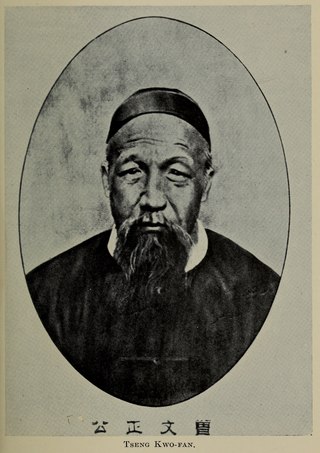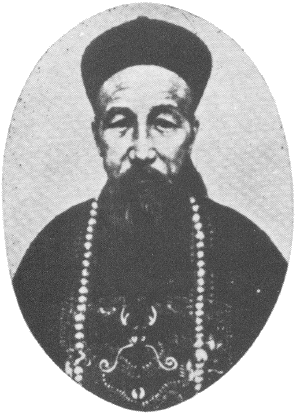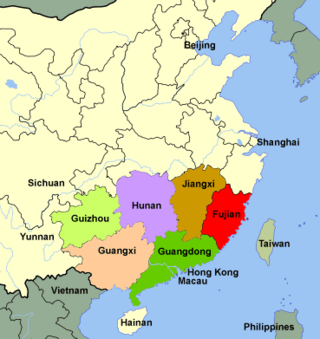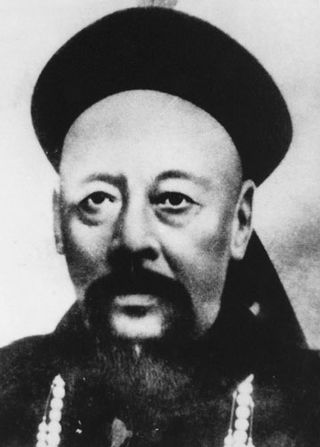| |||||
| Decades: | |||||
|---|---|---|---|---|---|
| See also: | Other events of 1856 History of China • Timeline • Years | ||||
Events from the year 1856 in China .
| |||||
| Decades: | |||||
|---|---|---|---|---|---|
| See also: | Other events of 1856 History of China • Timeline • Years | ||||
Events from the year 1856 in China .

The Taiping Rebellion, also known as the Taiping Civil War or the Taiping Revolution, was a massive civil war in China between the Manchu-led Qing dynasty and the Hakka-led Taiping Heavenly Kingdom. It lasted from 1850 until the fall of Tianjing in 1864, although the last rebel army was not wiped out until August 1871. The conflict resulted in approximately 20 million deaths. The established Qing government won decisively, although at great cost to its fiscal and political structure.

The Second Opium War, also known as the Second Anglo-Sino War, the Second China War, the Arrow War, or the Anglo-French expedition to China, was a colonial war lasting from 1856 to 1860, which pitted the British Empire and the French Empire against the Qing dynasty of China.

Zeng Guofan, Marquis Yiyong, birth name Zeng Zicheng(Chinese:子誠), courtesy name Bohan, was a Chinese statesman and military general of the late Qing dynasty. He is best known for raising and organizing the Xiang Army to aid the Qing military in suppressing the Taiping Rebellion and restoring the stability of the Qing Empire. Along with other prominent figures such as Zuo Zongtang and Li Hongzhang of his time, Zeng set the scene for the Tongzhi Restoration, an attempt to arrest the decline of the Qing dynasty. Zeng was known for his strategic perception, administrative skill and noble personality on Confucian practice, but also for his ruthlessness in repressing rebellions.

The Nian Rebellion was an armed uprising that took place in northern China from 1851 to 1868, contemporaneously with Taiping Rebellion (1851–1864) in South China. The rebellion failed to topple the Qing dynasty, but caused immense economic devastation and loss of life that became major long-term factors in the collapse of the Qing regime in the early 20th century.

The Xiang Army or Hunan Army was a standing army organized by Zeng Guofan from existing regional and village militia forces called tuanlian to contain the Taiping Rebellion in Qing China. The name is taken from the Hunan region where the Army was raised. The Army was financed through local nobles and gentry, as opposed to through the centralized Manchu-led Qing dynasty. The army was mostly disbanded by Zeng after the re-capture of the Taiping capital at Nanking.

Zeng Guoquan, courtesy name Yuanfu, art name Shuchun, was a Chinese official and military leader of the late Qing dynasty. He was the ninth brother of Zeng Guofan, a prominent statesman and general, and a descendant of the philosopher Zengzi. He served in the Xiang Army, a standing military force organised by his brother to counter the Taiping rebels, and was nicknamed "Ninth Marshal" (九帥). He was known for his expertise in siege warfare, particularly the use of trenches, hence he was also nicknamed "Zeng the Iron Container" (曾鐵桶). During the conquest of Tianjing (Nanjing), the capital of the Taiping Heavenly Kingdom, Zeng was notorious for condoning massacres of the city populace, which resulted in him being called "Zeng the Butcher" (曾屠戶).
Jiangnan Daying or the Jiangnan Battalion; was an army group assembled by the Qing dynasty. The army group consist of mostly Green Standard Army, and their goal was to quell the Taiping Rebellion around the Jiangnan region. The army group twice encircled Nanjing, the capital of the Taiping Heavenly Kingdom, but were defeated by the Taiping forces on both occasions.
The Battle of Jiangnan (1860), also known as the Second rout of the Jiangnan Battalion was a battle between the Qing government's Green Standard Army and the army of the Taiping Heavenly Kingdom during the Taiping Rebellion. The Green Standard Army twice attempted to besiege Nanjing, capital of the Taiping Heavenly Kingdom, but was unable to break through. To break the siege of Nanjing, the Taiping forces maneuvered to divert Qing forces by sacking Hangzhou, before quickly moving back to Nanjing to counter-encircle the Qing siege forces and routing the Green Standard Army garrison completely, breaking the siege of Nanjing.
Li Rongfa (1845–1891) was a military rebel leader of the Taiping Rebellion. He was the second son of Li Xiucheng.

The Taiping Heavenly Kingdom (1851–1864) was a Chinese Christian theocratic absolute monarchy which sought to overthrow the Qing dynasty. The Heavenly Kingdom, or Heavenly Dynasty, was led by King Hong Xiuquan and his followers. Its capital was at Tianjing. The unsuccessful war it waged against the Qing is known as the Taiping Rebellion.
The Miao rebellion of 1854–1873, also known as the Qian rebellion was an uprising of ethnic Miao and other groups in Guizhou province during the reign of the Qing dynasty. Despite its name, Robert Jenks estimates that ethnic Miao made up less than half of the uprising's participants. The uprising was preceded by Miao rebellions in 1735–36 and 1795–1806, and was one of many ethnic uprisings sweeping China in the 19th century. The rebellion spanned the Xianfeng and Tongzhi periods of the Qing dynasty, and was eventually suppressed with military force. Estimates place the number of casualties as high as 4.9 million out of a total population of 7 million, though these figures are likely overstated.

The Red Turban Rebellion of 1854–1856 was a rebellion by members of the Tiandihui in the Guangdong province of South China.

Liu Bingzhang was a Qing dynasty Chinese scholar-official and general. He served as Governor of Jiangxi and Zhejiang provinces and Viceroy of Sichuan. He was a commander in the civil war against the Taiping Rebellion and Nian Rebellion, and the Battle of Zhenhai during the Sino-French War.

Hong Xuanjiao, was a Chinese female general and rebel leader during the Taiping Rebellion. She was the sister of the leader of Taiping Heavenly Kingdom, Hong Xiuquan. She acted as co-commander of the Taiping forces during the civil war against the Imperial forces of the Qing dynasty. Xuanjiao and her brother, Xiuquan, established the Taiping Heavenly Kingdom over varying portions of southern China with himself as the "Heavenly King" and self-proclaimed younger brother of Jesus Christ.
Events from the year 1860 in China.
Events from the year 1857 in China.
Events from the year 1855 in China.
Events from the year 1862 in China.
Events from the year 1864 in China.
Events from the year 1865 in China.